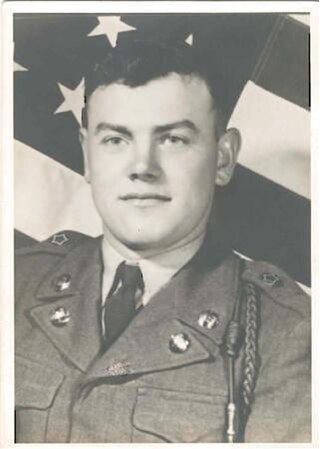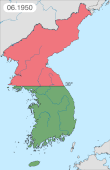Related Research Articles

In politics, a defector is a person who gives up allegiance to one state in exchange for allegiance to another, changing sides in a way which is considered illegitimate by the first state. More broadly, defection involves abandoning a person, cause, or doctrine to which one is bound by some tie, as of allegiance or duty.

Charles Robert Jenkins was a United States Army deserter, North Korean prisoner, and voice for Japanese abductees in North Korea.
Larry Wu-tai Chin was a Chinese Communist spy who worked for the United States Government for 37 years (1944–1981), including positions at the U.S. Army and the CIA, while secretly being a mole for the Chinese Communist Party's intelligence apparatus from the very beginning. He kept passing classified documents and secret information to the People's Republic of China even after his retirement, until he was finally exposed in 1985.

The People's Volunteer Army (PVA), officially the Chinese People's Volunteers (CPV), was the armed expeditionary forces deployed by the People's Republic of China during the Korean War. Although all units in the PVA were actually transferred from the People's Liberation Army under the orders of Chairman Mao Zedong, the PVA was separately constituted in order to prevent an official war with the United States. The PVA entered Korea on 19 October 1950 and completely withdrew by October 1958. The nominal commander and political commissar of the PVA was Peng Dehuai before the ceasefire agreement in 1953, although both Chen Geng and Deng Hua served as the acting commander and commissar after April 1952 following Peng's illness. The initial units in the PVA included 38th, 39th, 40th, 42nd, 50th, 66th Corps; totalling 250,000 men. About 3 million Chinese civilian and military personnel had served in Korea throughout the war.

Operation Big Switch was the repatriation of all remaining prisoners of the Korean War. Ceasefire talks had been going on between the North Korean, Chinese and United Nations Command (UNC) forces since 1951, with the main point of contention being the repatriation of all prisoners to their home countries, in accordance with Article 118 of the 1949 Geneva Convention. China and North Korea wanted prisoners to be compulsorily repatriated as outlined by the Geneva Convention but the UNC insisted that prisoners who wished to remain where they were be allowed to do so. After talks dragged on for two years, the Chinese and North Koreans relented on this point, and the Korean Armistice Agreement was signed on 27 July 1953.

War Trash is a novel by the Chinese author Ha Jin, who has long lived in the United States and who writes in English. It takes the form of a memoir written by the fictional character Yu Yuan, a man who eventually becomes a soldier in the Chinese People's Volunteer Army and who is sent to Korea to fight on the Communist side in the Korean War. The majority of the "memoir" is devoted to describing this experience, especially after Yu Yuan is captured by United Nations forces and imprisoned as a POW. The novel captured the PEN/Faulkner Award and was a finalist for the Pulitzer Prize.

James George Veneris (1922–2004) was an American soldier during the Korean War who was captured by the Chinese and was one of 21 American soldiers at the end of the war who decided they would rather stay in China than return to the United States.

An American Dream: The Life of an African American Soldier and POW Who Spent Twelve Years in Communist China is a memoir by Corporal Clarence Adams posthumously published by the University of Massachusetts Press and edited by Della Adams and Louis H. Carlson.

Charles E. Kelly was a United States Army soldier and a recipient of the United States military's highest decoration for valor—the Medal of Honor—for his actions in World War II. Kelly was the third enlisted man to be decorated with the Medal of Honor for action on the European continent, after S/Sgt Maynard H Smith 306th Bomb Group and Flight Officer John C "Red" Morgan 92nd Bomb Group, Hanover, July 28, 1943.
Samuel David Hawkins was the youngest of the American defectors of the Korean War. Hawkins was one of twenty-two American and British servicemen to defect to China after the conclusion of the war in 1953. Hawkins returned to the United States in 1957.

Sergeant Richard George Desautels was a United States Army corporal who was captured on December 1, 1950 at Sonchu by communist forces and not returned by North Korea at the end of the fighting of the Korean War. More than half a century later, the People's Republic of China admitted that Sgt. Desautels died while in captivity in China, and that his remains were buried in Shenyang, China.
Tens of thousands of South Korean soldiers were captured by North Korean and Chinese forces during the Korean War (1950–1953) but were not returned during the prisoner exchanges under the 1953 Korean Armistice Agreement. Most are presumed dead, but the South Korean government estimated in 2007 that some 560 South Korean prisoners of war (POWs) still survived in North Korea. The issue of unaccounted South Korean POWs from the Korean War has been in dispute since the 1953 armistice. North Korea continues to deny that it holds these South Korean POWs. Interest in the issue has been renewed since 1994, when Cho Chang-ho, a former South Korean soldier presumed to have been killed in the war, escaped from North Korea. As of 2008, 79 former South Korean soldiers had escaped from North Korea.
Americans in North Korea consist mainly of defectors and prisoners of war during and after the Korean War, as well as their locally born descendants. Additionally, there are occasional tours and group travel which consists of Americans via train or plane from China, some with temporary lodging and stay.

Operation Beleaguer was the codename for the United States Marine Corps' occupation of northeastern China's Hebei and Shandong provinces from 1945 until 1949. The Marines were tasked with overseeing the repatriation of more than 600,000 Japanese and Koreans that remained in China at the end of World War II. During the four-year occupation, American forces engaged in several skirmishes with the People's Liberation Army while successfully evacuating thousands of foreign nationals. The United States Government attempted to mediate a peace treaty between the opposing Nationalist and Communist factions but was unsuccessful. The Marines departed Northern China in June 1949 a few months before the communists won victory in the Chinese Civil War and took control of mainland China.

Clarence Adams was an African-American GI during the Korean War. He was captured on November 29, 1950, when the People's Liberation Army overran his all-black artillery unit's position. Adams was held as a POW until the end of the war. Instead of returning to the United States during Operation Big Switch, Adams was one of 21 American soldiers who chose to settle in the People's Republic of China. As a result of their decision, these 21 Americans were considered defectors.

After the Korean War, 333 South Korean people detained in North Korea as prisoners of war chose to stay in North Korea. During subsequent decades of the Cold War, some people of South Korean origin defected to North Korea as well. They include Roy Chung, a former U.S. Army soldier who defected to North Korea through East Germany in 1979. Aside from defection, North Korea has been accused of abduction in the disappearances of some South Koreans.

The Bamboo Prison is a 1954 American Korean War–drama film directed by Lewis Seiler and starring Robert Francis, Brian Keith, Dianne Foster, and Jerome Courtland. The working title was I Was a Prisoner in Korea. The US Army denied their co-operation to the producers.

Bert Cumby was a United States military intelligence officer who served as head of research of the U.S. Army's Military Intelligence Corps and led the debriefing of repatriated American prisoners of war (POWs) during the Korean War. In 1956 he testified to a United States Senate committee regarding an international communist conspiracy he alleged was underway, the objective of which was the admission of the People's Republic of China to the United Nations and the establishment of diplomatic relations between the United States and China. According to Cumby, this was to be partially accomplished through the brainwashing of American POWs prior to their repatriation to the United States; they would, in turn, create a nucleus of domestic support for China-friendly policies within the U.S.
Claude Batchelor is a former United States Army soldier convicted by court martial of collaborating with China during the Korean War.

"P.O.W." was an American television play that was broadcast by the American Broadcasting Company (ABC) on October 27, 1953. It was the first episode of the series The United States Steel Hour. The production examined the physical and mental suffering of former prisoners of war returning from the Korean War. Produced and directed by Alex Segal, the production starred Richard Kiley, Gary Merrill, and Brian Keith.
References
- 1 2 3 4 5 6 7 8 9 10 11 12 13 14 15 16 17 18 19 20 21 22 "Where are Korean War Defectors Now?" Grey Beards. Vol. 16. No. 4. July–August 2002.
- ↑ Tucker, Spencer C. (2012). Almanac of American Military History. ABC-CLIO.
- ↑ Operations Big and Little Switch Archived 16 July 2007 at the Wayback Machine
- ↑ "Defectors: By Mutual Consent". TIME.com. 15 July 1966. Archived from the original on 17 August 2007. Retrieved 15 March 2015.
- ↑ Michael Lollar. "The long road home". MCA. Retrieved 15 March 2015.
- 1 2 3 4 5 6 7 8 9 10 11 12 13 14 15 "Whereabouts of Nine Turncoats Unknown". Kingsport Post . 30 December 1965. Retrieved 31 December 2010.
- ↑ "The American POW who chose China". BBC News. 27 October 2011. Retrieved 15 March 2015.
- ↑ "Cases and Codes". FindLaw. Retrieved 15 March 2015.
- ↑ Brendan McNally (10 December 2013). "The Korean War Prisoner Who Never Came Home". The New Yorker . Retrieved 14 December 2013.
- ↑ "Stephen F. Austin State University Alumni Association" . Retrieved 15 March 2015.
- ↑ "The Supreme Court: Back Pay for Turncoats". TIME.com. 2 June 1961. Archived from the original on 13 August 2007. Retrieved 15 March 2015.
- ↑ Article about Lowell Skinner Archived 13 February 2006 at the Wayback Machine
- ↑ Veneris interview Archived 9 May 2006 at the Wayback Machine
- ↑ "Youth Defense League – Turncoat Lyrics". www.lyricsmania.com. Retrieved 15 March 2015.
- ↑ "YouTube". YouTube . Retrieved 15 March 2015.[ dead YouTube link ]
- ↑ "Mr. Aaron P. Wilson - View Obituary & Service Information".
- 1 2 "The Sydney Morning Herald". news.google.com. Retrieved 4 September 2016– via Google News Archive Search.
- ↑ Andrew M. Condron, Richard G. Corden and Sgt. Larance V. Sullivan (eds.), Thinking Soldiers by Men Who Fought in Korea, (Beijing, 1955), pp. 1–2.
- ↑ "Archived copy" (PDF). Archived from the original (PDF) on 22 June 2013. Retrieved 5 September 2016.
{{cite web}}: CS1 maint: archived copy as title (link) - ↑ Beijing, David Rennie in (2 February 2001). "British plea to North Korea over fate of 82 soldiers" . Retrieved 5 September 2016.
- ↑ "What happened to the only British serviceman to refuse repatriation at the end of the Korean war? | Notes and Queries | guardian.co.uk". www.theguardian.com. Retrieved 4 September 2016.
- ↑ "[TMP] "Andrew 'Red' Condron – Korean Defector" Topic". theminiaturespage.com. Retrieved 4 September 2016.
